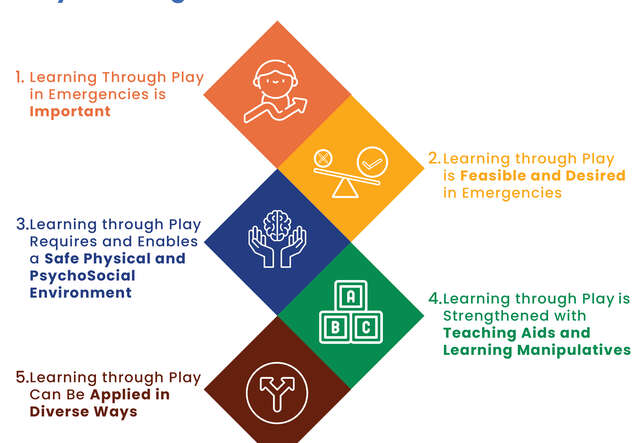Global trends of increased forced displacement, both internal and across borders, persist in the East Africa region. Ethiopia, Tanzania, and Uganda collectively hosted over 3 million refugees and asylum seekers in 2024 with nearly 3 million internally displaced peoples - a majority of whom are under the age of 18 (UNHCR Operational Data Portal; Internal Displacement Monitoring Centre). Given the scope and duration of forced displacement and its disproportionate effect on children, education as a form of healing is needed now more than ever. Play-based and active teaching and learning methods are critical in supporting the wellbeing of teachers and children. To commemorate this year’s International Day of Education, the PlayMatters Consortium recognizes the role of schools, teachers, and Learning through Play (LtP) teaching methods in fostering inclusive learning environments, bringing healing for teachers and students, and restoring a sense of normalcy for children affected by protracted and acute crises.
The PlayMatters project (2020 – 2026) seeks to strengthen refugee and refugee-hosting education systems’ capacity to train and support pre-primary and primary teachers to implement active LtP as an active teaching and learning method in their classrooms in Ethiopia, Tanzania, and Uganda. Throughout its implementation, PlayMatters has remained adaptable to respond to acute crises as they emerge including COVID-19 school closures, a multi-sectoral education in emergencies response, and a post-conflict accelerated learning program. Through these pivots, PlayMatters has synthesized evidence to identify five key learnings, three of which are highlighted below:

Learning through Play in Emergencies is Important
LtP develops a variety of critical skills for children, including literacy, numeracy, collaboration, and conflict resolution. LtP also strengthens parent-child interactions, teacher-student relationships and peer relationships amongst students. LtP can mitigate learning loss, restore a sense of hope and normalcy, and promote overall wellbeing to lay the foundation for continued education.
Learning through Play is Feasible and Desired in Emergencies
LtP, when defined as active teaching and learning methods that integrate guided playful activities, can work in a variety of crisis contexts. LtP can work in various physical spaces (homes, community safe spaces, non-formal learning spaces, schools) with myriad profiles of trained adults (teachers, caregivers, community leaders, social workers/child protection officers). LtP is a critical component to education in formal, nonformal, and community learning settings, strengthening access to quality educational opportunities for all children.
Learning through Play Requires and Enables a Safe Physical and Psychosocial Environment
n conflict-affected settings, considerable repairs may be needed to address issues such as mass graves, bullet holes, broken glass, and remnants of explosives to ensure children’s safety and mitigate potential triggers of trauma. Through LtP, teachers practice inclusive teaching practices and positive classroom management practices, leading students to not only appear happier and report increased wellbeing. LtP engages all children and strengthens a safe learning environment to promote inclusion, equity, and belonging for children.
The full Evidence Brief of these learnings and their associated study reports can be found on the PlayMatters website. PlayMatters is now incorporating these learnings to refine its existing emergency response pivots to develop a free, open-source Learning through Play in Emergencies Package to be launched in March 2025. Stay tuned for additional details on the virtual launch event and access to the PlayMatters LtP in Emergencies Package to bring the powerful benefits of LtP to children affected by crises.